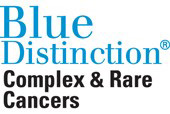Non-Hodgkin Lymphoma develops in the lymphatic system from cells called lymphocytes, white blood cells that battle infections. This kind of cancer develops in places like the lymph nodes, bone marrow, and the spleen, thymus or digestive tract.
Between 60,000 and 70,000 people per year get one of more than 60 different types of non-Hodgkin lymphoma, of which diffuse large B-cell is the most common.
There are more than 60 types of lymphoma. At Nebraska Medicine, we have world renowned team who can diagnose and treat all of them. Our team includes pioneers in cancer research, hematopathologists, oncologists, advanced practice providers, nursing and more. Patients come from around the world to seek the advanced treatments, second opinions and leading edge clinical trials offered here.
The Most Common Non-Hodgkin Lymphoma Subtypes Are:
B-Cell Lymphoma
- Diffuse Large B-Cell Lymphoma (DLBCL)
- Follicular Lymphoma
- Mantle Cell Lymphoma
- Chronic Lymphocytic Leukemia/Small Lymphocytic Lymphoma (CLL/SLL)
- Hairy Cell Leukemia
- Marginal Zone B-cell Lymphomas
- Extranodal Marginal Zone B-Cell Lymphomas (Mucosa-Associated Lymphoid Tissue MALT)
- Lymphoplasmacytic Lymphoma (Waldenstrom's Macroglobulinemia)
- Primary Effusion Lymphoma
- Burkitt Lymphoma
- Primary Central Nervous System (CNS) Lymphoma
Subtypes of T-Cell and NK-Cell Lymphoma
- Precursor T-Lymphoblastic Lymphoma/Leukemia
- Mycosis Fungoides
- Sezary Syndrome
- Lymphomatoid Papulosis
- Subcutaneous Panniculitis-Like T-Cell Lymphoma
- Primary Cutaneous Peripheral T-Cell Lymphomas, Unspecified
- Anaplastic Large Cell Lymphomas, Primary Cutaneous Type and Systemic Type
- Peripheral T-Cell Lymphoma, Not Otherwise Specified (NOS)
- Angioimmunoblastic T-Cell Lymphoma
- Adult T-cell Lymphoma/Leukemia
- Extranodal NK/T-Cell Lymphoma, Nasal Type
- Enteropathy-Associated T-Cell Lymphoma
- Gamma/Delta Hepatosplendic T-Cell Lymphoma
The Best Place for Cancer Care
The Fred & Pamela Buffett Cancer Center consists of a 10-story, 98-laboratory research tower named the Suzanne and Walter Scott Cancer Research Tower; an eight-story, 108-bed inpatient treatment center named the C.L. Werner Cancer Hospital; and a multidisciplinary outpatient center. With a comprehensive team of more than 200 cancer experts covering all specialties across the cancer spectrum, there is no need for people to travel outside the region for cancer care.
A Team Approach
With the many different types of lymphoma, it is imperative that your cancer be properly identified so doctors can formulate the best treatment plan for you. To precisely diagnose and treat your cancer, our hematopathologists - who are sought after nationally for their expertise - will carefully determine your specific type of lymphoma along with your team of treatment specialists. This team meets regularly to discuss your case and to develop a coordinated and personalized plan of care just for you.
Care When You Need It Most
Patients undergoing cancer treatment at Nebraska Medicine also have access to our 24/7 Infusion Center at the Fred & Pamela Buffett Cancer Center, which serves as both a treatment center and 24/7 urgent-care-type facility. A rare offering in the region.
Our dedicated lymphoma team works with you to choose the best possible care plan tailored to meet your needs. The choice of treatment often depends on how advanced the cancer is and whether or not it has favorable features. Treatments may include:
- Clinical Trials
- Chemotherapy
- Immunotherapy
- Chimeric Antigen Receptor (CAR) T-Cell Therapy
- Radiation Therapy
- Monoclonal Antibodies
- Targeted Therapies - these are drugs designed to target specific genes or proteins in types of cancer cells that spread the cancer.
- Blood and Bone Marrow Transplant
Clinical Trials
Access to clinical trials affords patients the ability to participate in leading edge treatments that otherwise would not be available to them. See what clinical trials related to Non-Hodgkin lymphomas are going on right now. Talk to your care team to see if there are clinical trials you may qualify for.
Nebraska Medicine is also part of the National Institutes of Health/National Cancer Institute Bone Marrow Transplant Clinical Trials Network – a consortium transplant centers across the country that collaborate on clinical trials to derive data from a larger population of patients and to allow for greater sharing of information between centers. Through this network, doctors can study and refine their techniques to diagnose, treat and follow patients to provide them with optimal care.
Accreditations and Awards
The American Society of Clinical Oncology Quality Oncology Practice Initiative
Nebraska Medicine has been recognized by the Quality Oncology Practice Initiative (QOPI®) Certification Program, an affiliate of the American Society of Clinical Oncology. The QOPI® Certification Program (QCP™) certifies oncology practices that meet nationally recognized standards for cancer care. This certification reaffirms our commitment to providing patients with high quality cancer care. Learn more about our certification.
Blue Cross Blue Shield of Nebraska Blue Distinction Center+
Blue Distinction Centers and Blue Distinction Centers+ have a proven history of delivering exceptional care and results. Nebraska Medicine has received Blue Distinction in adult and pediatric bone marrow/stem cell patient care.
Foundation for the Accreditation of Cellular Therapy (FACT)
The FACT Accreditation demonstrates our commitment to quality in cellular therapy and blood and marrow transplantation and verifies that our transplant program has met rigorous international standards.




